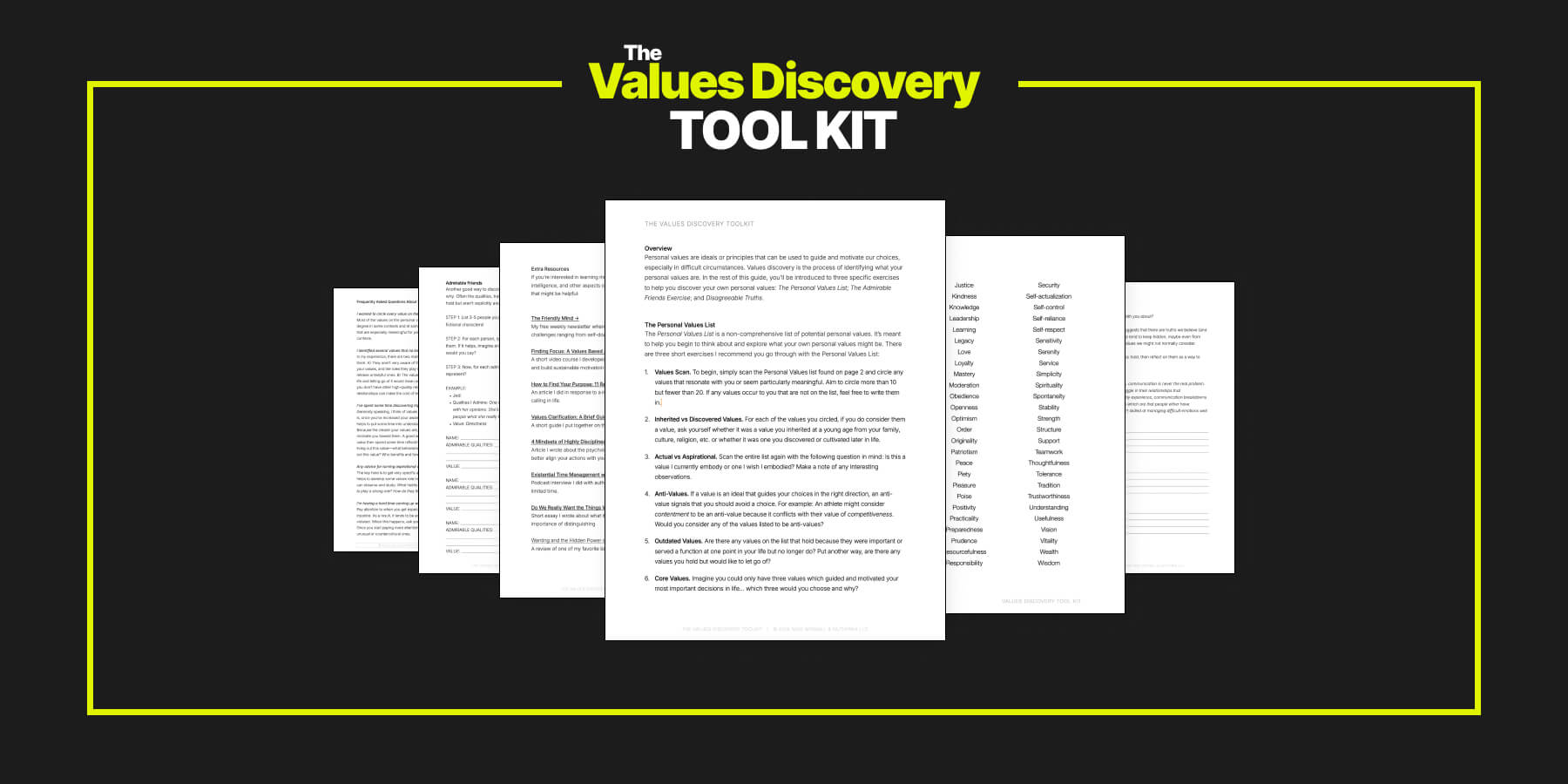How well do you know your values?
Probably not as well as you think, or at least not as well as you could. Which isn’t surprising since we’re very rarely asked or encouraged to deliberately reflect on our values.
Unfortunately, lack of values clarity is at the root of many of our struggles, both personal and professional…
- Do you struggle with self-doubt and confidence at work? If you’re not clear—and I mean really clear—about what you want, you’ll spend all your time avoiding what you don’t want, which is a recipe for anxiety and low self-confidence.
- Do you procrastinate on creative projects? Lack of focus and commitment often gets framed as a discipline problem, but in reality it’s usually a values problem… When you’re crystal clear about the why behind your creative work, your motivation improves dramatically.
- Do you struggle to be assertive and/or set good boundaries? By definition, assertiveness means communicating honestly about what you want and don’t want. But that’s difficult to do if what you want is vague and poorly-defined.
In the rest of this guide, I’ll briefly explain what personal values are, why they matter, and then share a handful of my favorite strategies for clarifying your values so you can make better decisions, with more confidence and motivation.
Values Discovery Tool Kit

Before we go on, I’ve put together many of the key ideas and exercises from this article into a short PDF guide which your can download for free here: The Values Discovery Tool Kit →
What Are Personal Values?
Values are principles or ideals that guide and motivate our behavior, especially in difficult situations or circumstances.
For example:
- If you have clarity around curiosity as a value in your work, you’ll be more likely to seek out tasks, projects, and even careers that stimulate your creativity and boost your motivation for your work.
- If you have clarity about authenticity as a value in your relationships, you’ll be less likely to get involved with people who are dishonest or unwilling to be honest and vulnerable, and as a result, make better relationship decisions.
- If you have clarity about your value of health and why it really matters to you, you’ll be far more motivated to stick with your healthy eating and exercise goals.
In other words, the more clarity you have about your values, the more motivation you will have to make good decisions and follow through on your best intentions.
What Is Values Clarification, Specifically?
Values clarification is the process of reflecting on and deepening your understanding of your values.
Most of us have a general sense of what we value. But because we haven’t made time to deliberately reflect on and explore those values, they tend to not be very helpful in our day-to-day lives.
On the other hand, when you make it a priority to really make those values sharp and clear, your decision-making, confidence, and motivation improve dramatically.
To make this a little more real, let me share a couple examples…
- Personally, I value curiosity, especially intellectual curiosity. I love learning and learning about new ideas in particular—as long as I can remember, I’ve gotten more excited and had more fun learning than just about anything else.
- But I’ve also found curiosity useful in my life as a guide for my behavior. For example: One of the reasons I never struggle with writer’s block or procrastination with my writing and newsletter is because I only choose to write about things I’m intensely curious about.
- And because I have a lot of clarity about what times of things stimulate my curiosity and which don’t, I’m pretty good at choosing topics and angles for my writing that have plenty of built-in motivation. In other words, because I”m clear about my value of curiosity, my work is intrinsically motivating rather than something I have to motivate myself to do.
Here’s another example of values clarification from a former client of mine…
- My client was a gentleman in his early 60s who mentioned health as an important value for him. But he was struggling to follow through on his health-related goals like exercising regularly and eating well.
- I quickly discovered that his value of health wasn’t very clarified. So I did some values clarification work with him and we discovered that one reason health really mattered to him was that he wanted to have more energy so that he could play sports with and generally “keep up with” his young grandsons. So for him, the more clarified version of health was something like vitality.
- Once he made this realization and started clarifying this value, his motivation to follow through on all of his health goals—from going for walks after dinner to less late-night snacking—improved dramatically.
But how do you actually go about clarifying your values?
5 Ways to Clarify Your Values
In my work as a psychologist, I spend a lot of time helping my clients (both individuals and teams) get clarity on their values and what really matters to them.
What follows are five of my favorite approaches to values clarity…
1. Frustration Flipping
We tend to think of frustration and the things that provoke it as negative experiences to be avoided. But seen from the right perspective, frustration contains a lot of useful information…
Whenever you find yourself frustrated, ask yourself:
What object am I being blocked from achieving and why does that object matter to me?
The answer to this question will often point you toward your values.
For example:
- You often get frustrated at your manager who drones on and on during weekly meetings, preventing your team from being productive and solving problems in a timely way.
- Exploring this frustration could be useful because it might be telling you that efficiency is a more important value for you than you realize.
- Because aside from making things more productive, efficiency—you’re starting to realize—is also a form of respect for you… When people are efficient and thoughtful about time, it shows respect for other people and their wants and needs.
Try this:
- Make a list of 3-5 things that frequently frustrate you in your life.
- For each frustration, ask yourself: What goal am I being thwarted from achieving? and then write that down.
- Now, for each goal, ask yourself: What might this tell me about my values?
In addition to helping you get more clarity about your values, this frustration flipping exercise is also a powerful way to reframe difficult emotions as opportunities for growth rather than defects to be fixed.
Learn More:
2. Write Down Your Bucket List
You’re probably familiar with the concept of a bucket list. Basically, it’s the list of things you want to do before you “kick the bucket,” as they say.
For example:
- Run a marathon
- Reconnect with my estranged brother
- Live in Italy for a year
- Learn to play the guitar
- Visit Machu Picchu
- Start my own business
- Write a science-fiction novel
But the funny thing about bucket lists is that while just about everyone has heard of one, almost no one has actually written one down…
Isn’t it strange that most of us haven’t taken the time to simply write down the things we want to do in life more than anything else?!
Well, like most challenges, the fact that you likely haven’t actually created a bucket list may just be an opportunity in disguise. And the reason: Creating your bucket list is a powerful way to uncover and clarify your values.
For example:
- Let’s say you spent a good 20-30 minutes jotting down your biggest goals and dreams in life—your bucket list.
- And let’s say you end up with 20 or so items on your bucket list.
- Then after scanning them over, you see an interesting pattern: More than half of them involve travel.
- This suggests that traveling, exploration, or adventure might be an important value for you.
Here’s another example:
- Suppose you’re scanning your newly crafted bucket list and you realize many of the items are pretty solitary in nature.
- This might suggest that solitude is actually an important value for you.
- And while you don’t necessarily need to go backpacking in Southeast Asia by yourself for a year, making more time to be alone in your regular life might be worth exploring.
So, if you haven’t already, take a half an hour one Saturday morning, sit down with a pen and paper, and start brainstorming items for your bucket list.
The bucket list exercise is especially good at clarifying and surfacing values that you discredit or don’t normally give enough importance to in everyday life.
Learn More:
3. The Uncomfortable Truths Question
One of my favorite questions to ask people is:
What important truth do you believe that very few people agree with you about?
I just think this is an endlessly fascinating question. And I frequently use it myself and with clients as a tool for values discovery and clarification.
One reason this question is so powerful is because it encourages you to distinguish between inherited values from constructed values.
Wait, what’s an inherited value?
An inherited value is a value that you hold because it was passed down to you from another person or your society/culture more generally.
For example:
- Politeness is an inherited value for me.
- I was taught from a young age that saying please and thank you was the right thing to do. So I did (mostly) and continue to do so.
- I inherited this from my parents, and because it’s generally seemed to work out well for me, I keep doing it.
Now, here’s the thing: There’s nothing necessarily wrong with inherited values. In fact, all our values are inherited to some degree. However…
It can be dangerous if your entire value system is inherited and assumed without much deliberate reflection.
For example:
- I was working with a client recently who described how, in her family growing up, obedience to authority was a very important inherited value. And how she had never really questioned this value that was now leading to some major difficulties with anxiety and assertiveness in her adult life.
- As part of our work together, we started examining this inherited value to see how it was working (or not working) in her life now.
- The end result was, she did some major clarifying and updating of that value—meaning, through a lot of reflection and experimentation, she deprioritized obedience as a value in her life which made it far easier for her to work on communicating her needs more assertively and building self-confidence.
So how, exactly, does this Uncomfortable Truths question help me clarify my values?
The Uncomfortable Truths question— What important truth do you believe that very few people agree with you about?—forces you to really look at how many of your values are simply inherited without much conscious reflection or consideration.
What many people who spend some time with this question discover is that they don’t have many—if any—beliefs that most people disagree with them on. And while this isn’t necessarily a bad thing, it can be a sign that you’re overly conventional or deferential to other people, including with your values.
And when this is the case—when all or most of your values are inherited without much intentionality—you can end up unhappy and unfulfilled because your own needs, preferences, and desires don’t have a way to be expressed and cultivated.
Keep in mind, this is a question to reflect on over time, not simply ask yourself once. And again, I want to reinforce that there’s nothing wrong per se with inherited values. The trick is to have a good balance of values that you inherit and ones that you discover and construct personally.
Learn More:
- Wanting and the Hidden Power of Mimetic Desire
- The Uncomfortable Truths question is inspired by a similar question from the book Zero to One.
4. Create a Personal Vision Statement
A personal vision statement is a manifesto for the kind of person you aspire to be.
While writing down your Bucket List was about creating a specific vision for things you wanted to do, a Personal Vision Statement is about creating a specific vision for who you want to be. And similar to the Bucket List, a personal vision statement can also help you discover patterns and themes that help you clarify your values.
To get started, use the following prompts as reflection questions:
- What qualities do I want to cultivate? Be more patient with my kids. Be a better listener with my friends. Be less judgmental and more compassionate with myself when I make mistakes.
- What habits do I want to build? Exercise regularly. Do an annual retreat. Stick to one serving of food at dinner. Floss every night. Make time to call up old friends at least once a month.
- How do I hope other people describe me when I’m not around? Kind. Helpful. Thoughtful. Decisive. Cheerful. Brutally honest. Compassionate. Gentle. Funny. Supportive.
- In the story of my life, what are the main obstacles to overcome? My habit of negative self-talk. Being afraid to speak my mind. Pushing away my romantic interests when the relationship starts to get deeper and more emotionally intimate.
- Who are my personal heroes? Uncle Frank because he’s always taken a genuine interest in me and treated me like an equal, even when I was a kid. Ms. Kidder, my 9th-grade geometry teacher because she always saw the best in people.
Try not to overthink this or get perfectionistic about it…
- Your personal vision statement can look however you want. It could be half a page long or 20 pages. It could be typed out on an old typewriter or handwritten. You could write it in a fancy leather journal or type it out in the notes app on your phone.
- You can always update, revise, and revisit your personal vision statement. There’s no “getting it right” when it comes to your personal vision statement. This is something you should just do and then revisit from time to time and update.
Creating a personal vision statement just means making a little time to clarify and get specific about who you aspire to be and who you are at your best. And when you do this, you can’t help but see all sorts of personal values jump out at you.
5. Describe the 3 Happiest Days of Your Life
At this point, you’re probably catching on to the idea that discovering values is mostly about looking for patterns. Because the truth is you likely already have many values—at least in some basic form. We just need to learn how to see them more clearly and then clarify them a bit.
One useful source of information for values clarity is your past—specifically, the best times in your past.
One of my favorite exercises I “prescribe” my own clients is to think about the three happiest days of their life. Then try to remember as much as possible for each:
- Sometimes this involves looking through old photo albums to see what those days were like.
- Sometimes it involves calling up one of the people you spent that day with to get their perspective on what happened and what it was like.
- Sometimes it just means writing down the story of that day (it’s amazing how many details you start to remember when you put a day in story form).
Your very happiest days can often tell you a lot about what you value most.
For example:
- If all three of your happiest days involved doing something new or creative, that might suggest that creativity is a bigger value in your life than you think.
- Or if all three of your happiest days were noticeably free from time pressure or scheduling constraints, that might be a hint that spontaneity or autonomy are underappreciated values for you.
The nice thing about the 3 happiest days exercise is that it forces you to use real-life (not just speculation) as a clue to what your values are.
A Final Thought: Values Updating
Values are rarely completely static unchanging things.
With a few exceptions, most of our values—especially personal values—can and should change or adjust over time and in different contexts and areas of life…
For example: Maybe adventurousness is a really important value in your 20s. But as you settle down and start a family, industriousness or intimacy becomes more important. Or maybe not! Maybe precisely because you’ve “settled down” adventurousness becomes even more important than it was when you were young, single, and carefree.
The point is that discovering and clarifying your personal values is not something you do once and then are done with it. It’s an ongoing process that, ideally, should be a regular part of our lives.
In addition to discovering and clarifying your values, it’s important to regularly update your values.
That is, make time to revisit your values and determine their relative importance given where you are personally in your life.
By definition, values are relatively stable things—certainly more stable than passing thoughts, emotions, moods, or preferences. But that doesn’t mean they don’t change or evolve at all.
Next Steps
If you enjoyed this essay, here are a few more from me that might be helpful:
Work with Me
If you’re interested in working with me directly, I have a small mindset coaching practice where I work with motivated individuals to overcome inner obstacles to success.





5 Comments
Add YoursThis article provides clear idea designed for the new users of blogging, that genuinely how to do running a blog.
What’s up, I would like to subscribe for this web site to obtain hottest updates, thus where can i do it please help.
Remarkable! Its truly amazing piece of writing, I have got much clear idea about from this piece of writing.
I go to see everyday some blogs and blogs to read posts, but this webpage provides quality based writing.
For hottest news you have to pay a visit internet and on web I found this web page as a finest web page for latest updates.